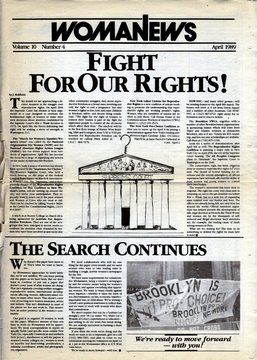 April 1989 front page | |
| Type | Monthly newspaper |
|---|---|
| Editor | WomaNews Collective |
| Founded | 1979 |
WomaNews was the name of two radical feminist newspapers that were active around the same time. One began in Gainesville, Florida in the 1970s and another was started in New York, New York. There was no connection between them; the following descriptions seem apt for both.
The Florida publication was founded by a group of women who sought to provide a platform for feminist voices that were often marginalized in mainstream media. The newspaper covered a wide range of topics, including women's rights, reproductive freedom, sexuality, race, and class issues.
WomaNews was known for its provocative and unapologetic approach to feminist activism, often publishing articles that challenged traditional gender roles and societal norms. The newspaper was also a key player in the feminist movement, providing a platform for women to share their stories and experiences.
The publication faced numerous challenges during its run, including financial difficulties and disputes over editorial content. Despite these challenges, WomaNews remained a vital force in the feminist movement, inspiring generations of women to fight for gender equality and social justice. While the newspaper ceased publication in the early 1990s, its legacy lives on in the ongoing struggle for gender equality and feminist activism.